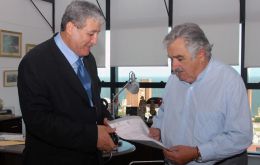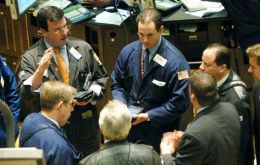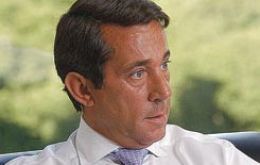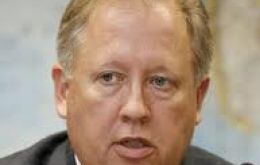MercoPress. South Atlantic News Agency
Stories for 2011
-
Wednesday, March 16th 2011 - 03:59 UTC
Uruguay recognizes Palestinian sovereign state and will open embassy in Ramallah

Uruguay announced on Tuesday it had recognized a Palestinian state, becoming the latest in a string of Latin American countries to make an endorsement in recent months the United States has called premature.
-
Wednesday, March 16th 2011 - 03:05 UTC
Japanese stocks rebound; central bank injects 326 billion USD in three days

Japanese stocks rebounded Wednesday as concerns over the long-term impact of Friday's earthquake and tsunami on Japan's economy ease.
-
Wednesday, March 16th 2011 - 01:32 UTC
‘Frozen’ Japanese economy expected to rebound positively in third quarter

Friday's earthquake and tsunami have left parts of Japan's economy “frozen”, but analysts forecast that it will bounce back later this year. Some of the country's leading producers, including the world's biggest carmaker, Toyota, have closed all of their plants in the country.
-
Wednesday, March 16th 2011 - 01:23 UTC
State elections behind Merkel’s decision to halt 7 of Germany’s 17 nuclear reactors

German Chancellor Angela Merkel is backtracking on nuclear power as the atomic emergency in Japan becomes an issue in state-election campaigns. Merkel’s decision to halt seven of Germany’s 17 reactors includes two in Baden-Wuerttemberg, where her party is battling to retain its 59-year-hold on the state in a March 27 vote.
-
Wednesday, March 16th 2011 - 00:41 UTC
Fed leaves rates unchanged with the US economy on a ‘firmer footing’ recovery

Arguing that the US economic recovery is on a firmer footing, and overall conditions in the labour market appear to be improving gradually, the Federal Reserve on Tuesday left interest rates unchanged at a record low of zero to 0.25% since December 2008.
-
Tuesday, March 15th 2011 - 23:49 UTC
Mercosur claims EU is willing to continue negotiations, but requests more time

Mercosur was prepared to listen to proposals on liberalizing trade, but the European Union requested more time and continue working with the negotiations, according to Mercosur delegates attending the trade talks with EU in Brussels.
-
Tuesday, March 15th 2011 - 23:47 UTC
Cuba devalues currency 8% to boost exports and imports substitution process

Cuba devalued its convertible peso by 8% Monday to the level of parity with the US dollar as part of efforts to boost the island's flagging economy, the central bank said. Use of the convertible peso is limited to tourists and other foreigners, for Cubans who receive remittances from abroad and for export activity
-
Tuesday, March 15th 2011 - 23:38 UTC
EU chief negotiator admits ‘complications’ but confident of a trade accord with Mercosur

A strongly worded resolution from Members of the European Parliament earlier this month outlining their concerns over agriculture does not represent a setback for EU-Mercosur trade talks, the EU chief negotiator said in Brussels.
-
Tuesday, March 15th 2011 - 11:12 UTC
The Queen’s Commonwealth Day speech
Last week, on the 8th of March, we marked the hundredth anniversary of the first International Women’s Day. The idea of having a women’s day was first proposed against the backdrop of the rapid industrialisation of the early twentieth century.
-
Tuesday, March 15th 2011 - 11:05 UTC
President Obama will underline ‘coincidences’ during his visit to Brazil

US ambassador in Brazil Thomas Shannon downplayed differences between Washington and Brasilia saying that coincidences are far greater and will be the core of discussions during the coming visit of US president Barack Obama next week end.
